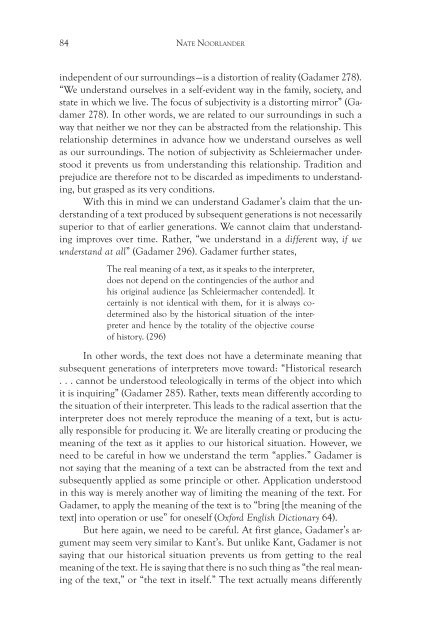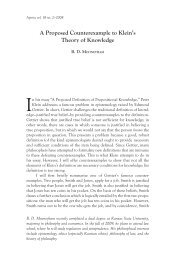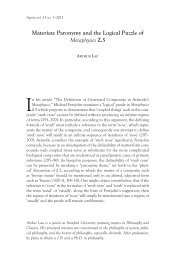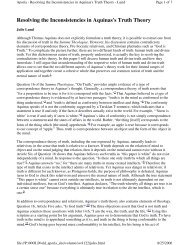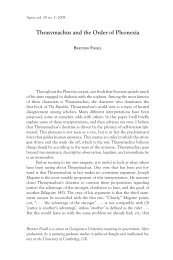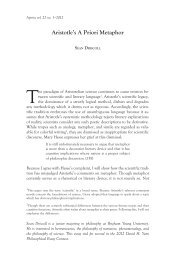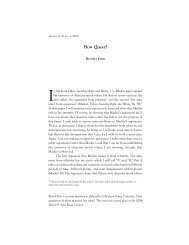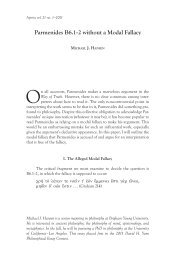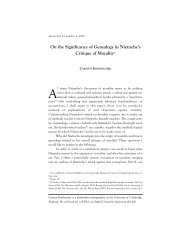Hermeneutics after Kant - Aporia - Brigham Young University
Hermeneutics after Kant - Aporia - Brigham Young University
Hermeneutics after Kant - Aporia - Brigham Young University
Create successful ePaper yourself
Turn your PDF publications into a flip-book with our unique Google optimized e-Paper software.
84<br />
Nate NoorlaNder<br />
independent of our surroundings—is a distortion of reality (Gadamer 278).<br />
“We understand ourselves in a self-evident way in the family, society, and<br />
state in which we live. The focus of subjectivity is a distorting mirror” (Gadamer<br />
278). In other words, we are related to our surroundings in such a<br />
way that neither we nor they can be abstracted from the relationship. This<br />
relationship determines in advance how we understand ourselves as well<br />
as our surroundings. The notion of subjectivity as Schleiermacher understood<br />
it prevents us from understanding this relationship. Tradition and<br />
prejudice are therefore not to be discarded as impediments to understanding,<br />
but grasped as its very conditions.<br />
With this in mind we can understand Gadamer’s claim that the understanding<br />
of a text produced by subsequent generations is not necessarily<br />
superior to that of earlier generations. We cannot claim that understanding<br />
improves over time. Rather, “we understand in a different way, if we<br />
understand at all” (Gadamer 296). Gadamer further states,<br />
The real meaning of a text, as it speaks to the interpreter,<br />
does not depend on the contingencies of the author and<br />
his original audience [as Schleiermacher contended]. It<br />
certainly is not identical with them, for it is always codetermined<br />
also by the historical situation of the interpreter<br />
and hence by the totality of the objective course<br />
of history. (296)<br />
In other words, the text does not have a determinate meaning that<br />
subsequent generations of interpreters move toward: “Historical research<br />
. . . cannot be understood teleologically in terms of the object into which<br />
it is inquiring” (Gadamer 285). Rather, texts mean differently according to<br />
the situation of their interpreter. This leads to the radical assertion that the<br />
interpreter does not merely reproduce the meaning of a text, but is actually<br />
responsible for producing it. We are literally creating or producing the<br />
meaning of the text as it applies to our historical situation. However, we<br />
need to be careful in how we understand the term “applies.” Gadamer is<br />
not saying that the meaning of a text can be abstracted from the text and<br />
subsequently applied as some principle or other. Application understood<br />
in this way is merely another way of limiting the meaning of the text. For<br />
Gadamer, to apply the meaning of the text is to “bring [the meaning of the<br />
text] into operation or use” for oneself (Oxford English Dictionary 64).<br />
But here again, we need to be careful. At first glance, Gadamer’s argument<br />
may seem very similar to <strong>Kant</strong>’s. But unlike <strong>Kant</strong>, Gadamer is not<br />
saying that our historical situation prevents us from getting to the real<br />
meaning of the text. He is saying that there is no such thing as “the real meaning<br />
of the text,” or “the text in itself.” The text actually means differently


